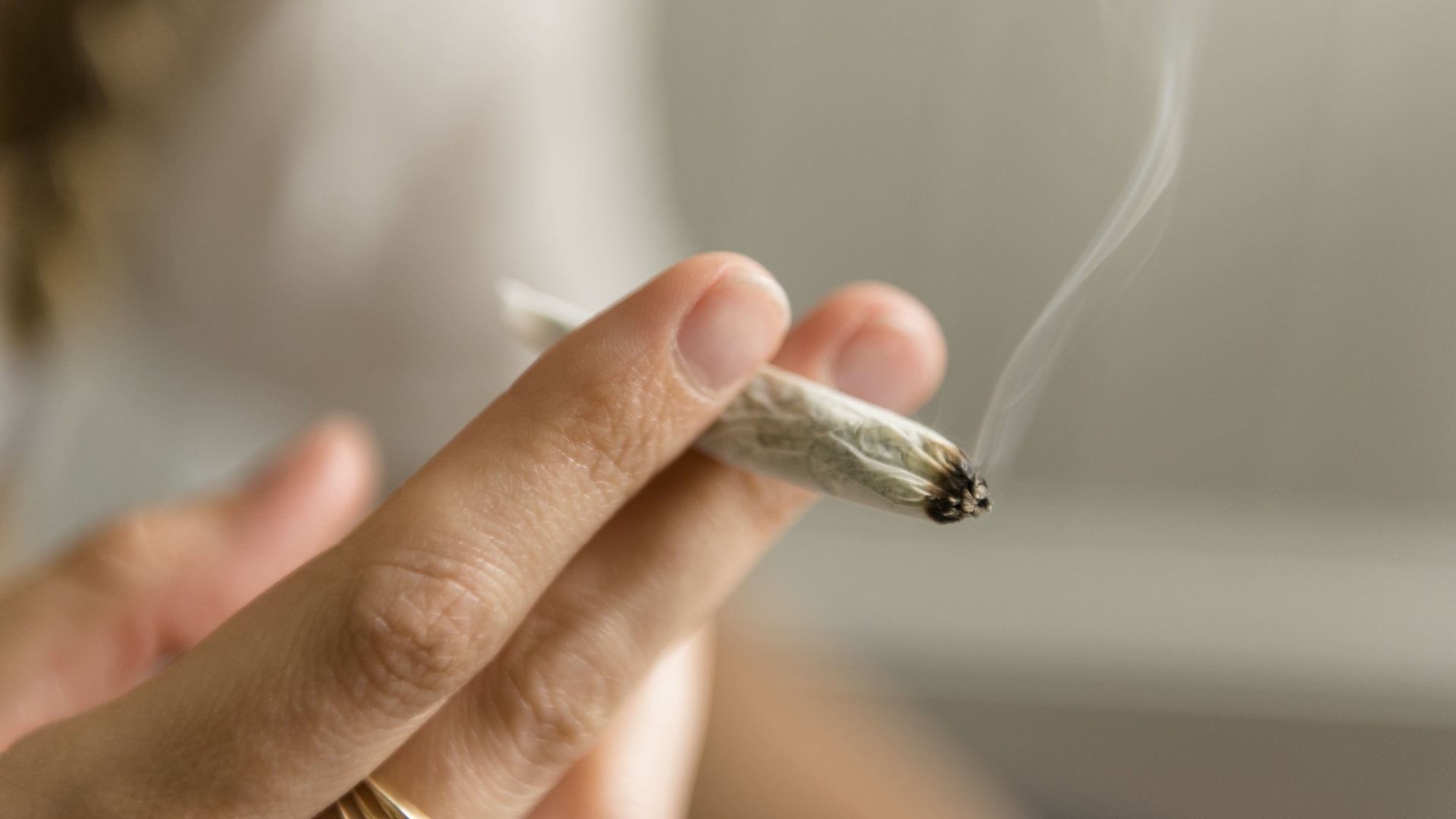Don't use cannabis during pregnancy or breastfeeding, leading OBGYN group says
The American College of Obstetricians and Gynecologists recommends that mothers abstain from cannabis use during prepregnancy, pregnancy and lactation, as research shows the drug is linked to serious health outcomes in newborns.

Get the world’s most fascinating discoveries delivered straight to your inbox.
You are now subscribed
Your newsletter sign-up was successful
Want to add more newsletters?

Delivered Daily
Daily Newsletter
Sign up for the latest discoveries, groundbreaking research and fascinating breakthroughs that impact you and the wider world direct to your inbox.

Once a week
Life's Little Mysteries
Feed your curiosity with an exclusive mystery every week, solved with science and delivered direct to your inbox before it's seen anywhere else.

Once a week
How It Works
Sign up to our free science & technology newsletter for your weekly fix of fascinating articles, quick quizzes, amazing images, and more

Delivered daily
Space.com Newsletter
Breaking space news, the latest updates on rocket launches, skywatching events and more!

Once a month
Watch This Space
Sign up to our monthly entertainment newsletter to keep up with all our coverage of the latest sci-fi and space movies, tv shows, games and books.

Once a week
Night Sky This Week
Discover this week's must-see night sky events, moon phases, and stunning astrophotos. Sign up for our skywatching newsletter and explore the universe with us!
Join the club
Get full access to premium articles, exclusive features and a growing list of member rewards.
People who are pregnant or lactating should not use cannabis, newly updated guidelines from the American College of Obstetricians and Gynecologists (ACOG) stress.
The professional group, which in a 2017 report already encouraged OB-GYNs to advise their patients against cannabis use during pregnancy, now recommends that clinicians systematically ask about, or "screen for", cannabis use by their patients before, during and after pregnancy. The updated guidelines, published in September, also say clinicians should educate their patients about the drug's potential risks.
"Just like we talk about tobacco use in pregnancy or alcohol use in pregnancy, cannabis use in pregnancy should be part of the natural conversation," said Dr. Amy Valent, an assistant professor of obstetrics and gynecology at the Oregon Health and Science University (OHSU) School of Medicine who participated in crafting the recommendations.
ACOG recommends universal screening for cannabis through interviews, self-reports and other validated tools, but the professional group advises against biological testing, which uses hair or urine samples to detect cannabis use. Historically, biological testing has disproportionately affected minorities.
"Black patients screen positive for substance use disorders at the same rate as White patients yet are 4-10 times more likely to have a positive drug screen result reported to child protective services," the guidelines emphasized.
Cannabis use on the rise
In recent years, more and more pregnant individuals have turned to cannabis as a "natural" way to alleviate symptoms such as nausea and vomiting. Some also use cannabis to help them cope with the stress and anxiety often associated with pregnancy.
Between 2002 and 2020, self-reported cannabis use has more than tripled among pregnant individuals in the U.S., according to a study published in 2022 that used data from the National Survey on Drug Use and Health. In 2002, 1.5% of pregnant individuals reported using cannabis without alcohol, compared to 5.4% in 2020.
Get the world’s most fascinating discoveries delivered straight to your inbox.
In addition, various studies show that, in the U.S., about 4% to 16% of people use the drug while pregnant.
"With the legalization of it [cannabis] in a lot of states, people are perceiving the risk to be very low," Dr. Alta DeRoo, a board-certified addiction medicine physician, obstetrician-gynecologist and the chief medical officer at the Hazelden Betty Ford Foundation who did help write the guidelines, told Live Science.
However, ACOG points out that there are no uses for cannabis during pregnancy that are backed by medical science and that it can have serious health consequences for newborns.
Growing evidence of serious health outcomes
The updated guidelines are based on a growing body of evidence that links cannabis use around the time of conception and throughout pregnancy with adverse outcomes, including preterm birth, low birth weight and higher rates of neonatal intensive care unit (NICU) admissions.
In addition, evidence suggests cannabis use during pregnancy and lactation could raise the risk of long-term health effects for children, including neurodevelopmental conditions like ADHD.
Studies have shown that THC, the main psychoactive ingredient in cannabis, can cross the placenta and transfer into breast milk. Cannabinoid receptors — "docking stations" that body-made cannabinoids and cannabinoids from plants can land on — are present in the fetus as early as five weeks of gestation, before a person might know they're pregnant.
"Cannabis exposure during pregnancy significantly decreases placental bloodflow, oxygen availability to the baby and causes changes in the placenta that are similar to placental insufficiency or dysfunction," said Dr. Jamie Lo, an associate professor of obstetrics and gynecology at the OHSU School of Medicine who was not involved in writing the guidelines. This placental dysfunction has been documented in both animal and human studies.
Researchers don't know whether there could be a safe amount of cannabis use during pregnancy.
"I think it's very similar to alcohol use, right? We know that there's a specific syndrome that's associated with alcohol use disorder in pregnancy, but we don't actually know if there's a 'safe amount," Valent said. "Therefore, we definitely know that there's harm with alcohol use in pregnancy, but we don't know to what degree people are going to be more or less vulnerable. And so we don't recommend alcohol use in pregnancy."
Cannabis products are not regulated by the Food and Drug Administration in the same way that pharmaceutical drugs are, she added. As such, they can be subject to cross contamination and other quality control issues. In light of that, Valent recommends that pregnant people stay away from all cannabis products, including CBD, the nonpsychoactive ingredient in cannabis.
Educating patients
In its recent clinical consensus, ACOG provided OB-GYNs with more information about the ways they can inform their patients about the risks associated with cannabis use during pregnancy and lactation, as well as better understand the reasons driving their personal use of the drug. ACOG also advised clinicians on how to guide patients toward safer alternatives that fit their needs.
"Parents want the best things for their children, and they're not trying to do something that might harm their children," Lo said. Many pregnant people who use cannabis likely do so "because they just don't know" the risks, she told Live Science. "And for the longest time, we didn't have great data."
Lo added that there's been a "significant surge of newer literature" over the past few years showing the same adverse outcomes associated with the use of cannabis during pregnancy. The new guidelines use stronger language that "gives the healthcare provider tools to actually feel like they're supported by evidence and a [professional] society in their recommendations," she added. "It's not just their personal opinion."
Valent said she hopes the new guidelines will help raise awareness and spark conversations between clinicians and patients.
"Communication is really powerful between a provider and their patient," she said. "Being able to support our patients and make sure that they feel supported along that path to cessation [stopping cannabis use] is really important."
This article is for informational purposes only and is not meant to offer medical advice.

Elise Ceyral is an award-winning journalist passionate about covering breakthroughs in health and science. As an Associate Editor for AARP, she wrote about brain health and healthy aging habits. Her work has appeared in AARP the Magazine, the AARP Bulletin, aarp.org and several French publications.
You must confirm your public display name before commenting
Please logout and then login again, you will then be prompted to enter your display name.
 Live Science Plus
Live Science Plus










